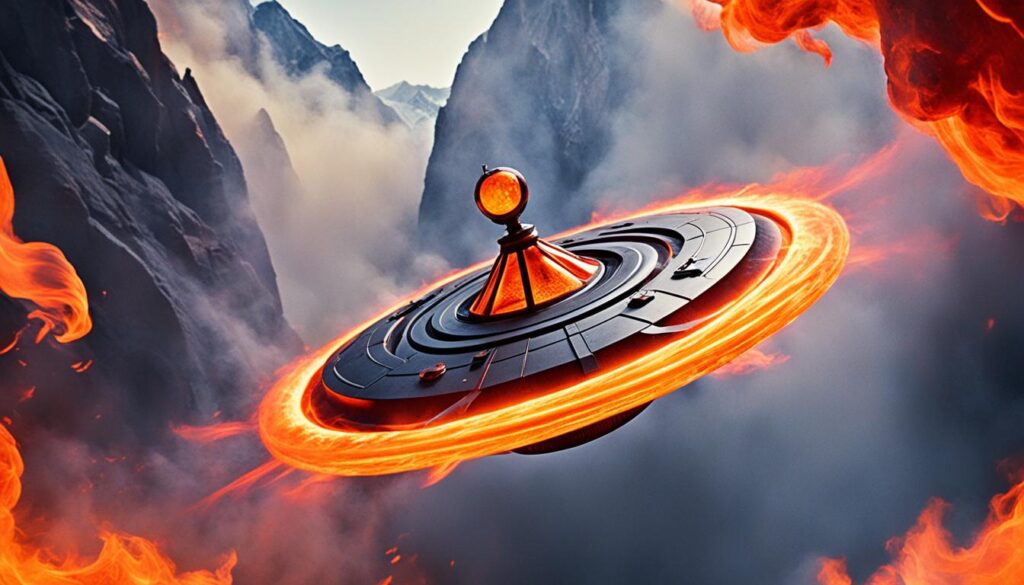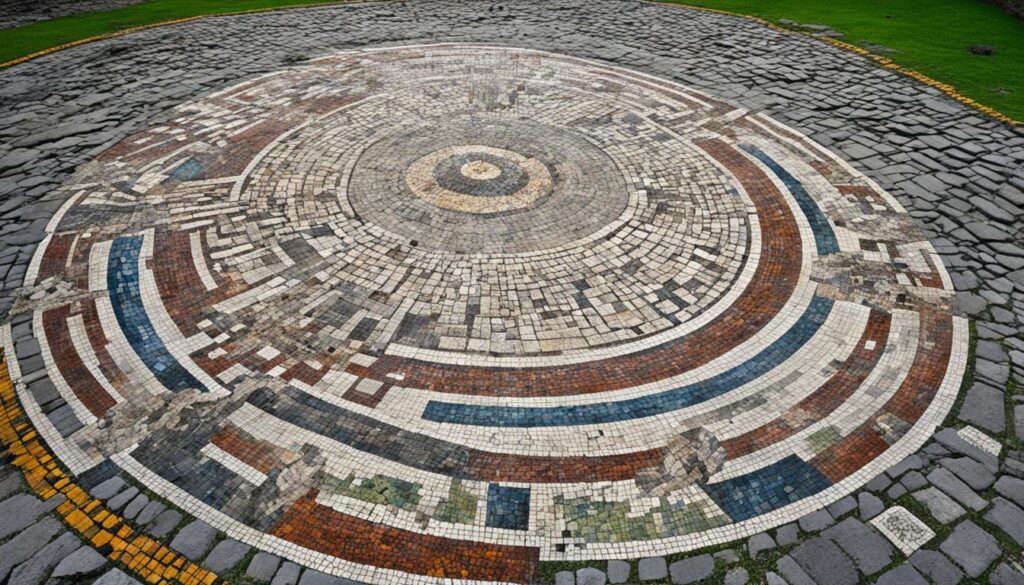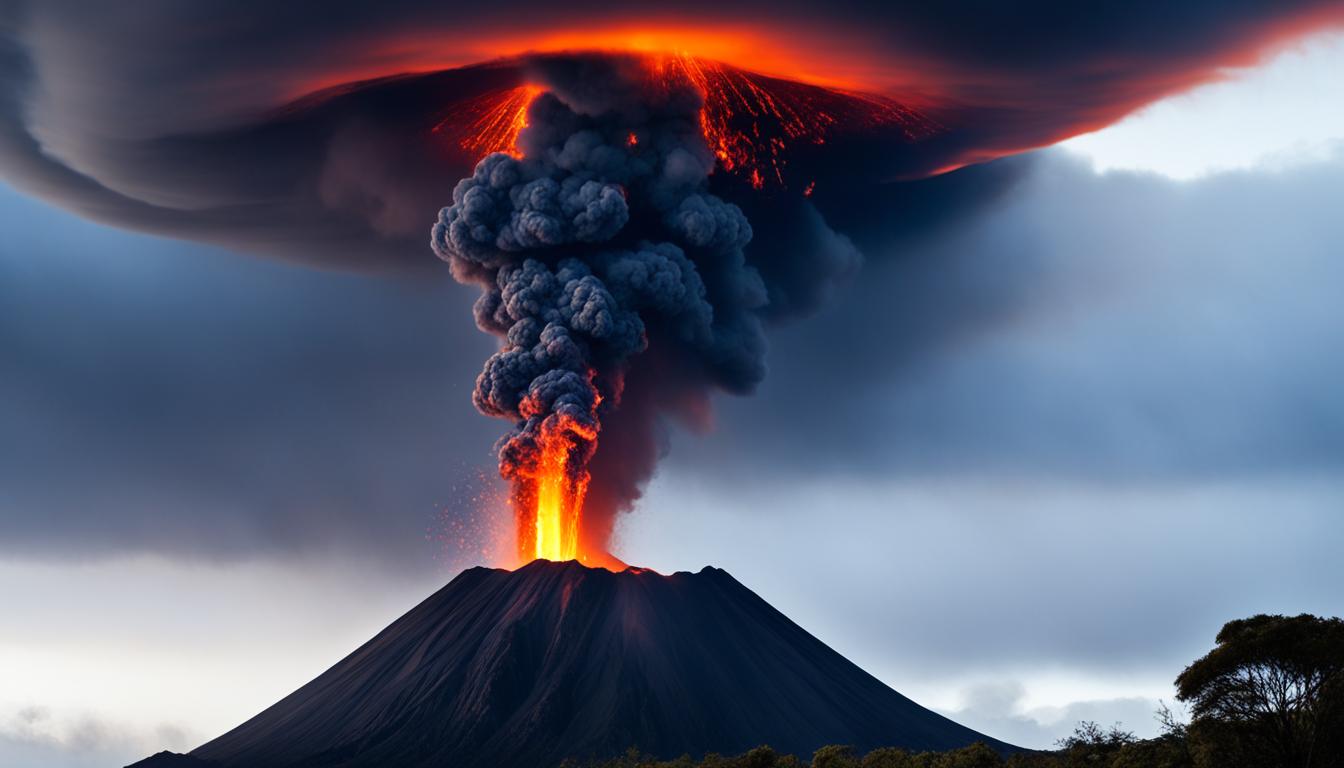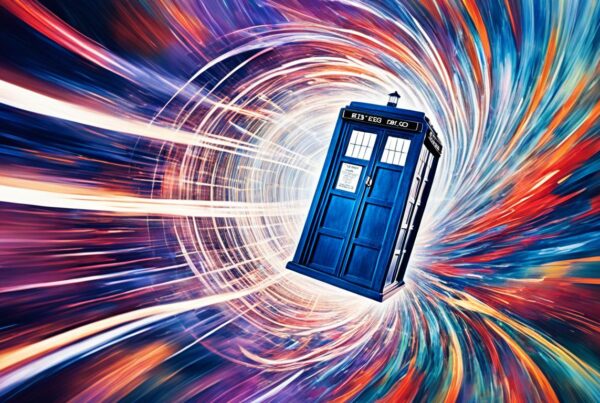Welcome to the captivating world of Dr. Who, where time-traveling adventures unfold in the most unexpected ways. In this article, we dive into the thrilling audiobook, ‘The Fires of Vulcan,’ which takes us on a journey to the ancient city of Pompeii. Strap yourself in for a mind-bending excursion through time with the iconic character, Dr. Who.
The Storyline of ‘The Fires of Vulcan’
In the audiobook ‘The Fires of Vulcan’, the Doctor finds himself and his companion, Evelyn Smythe, in the bustling city of Pompeii, just one day before the catastrophic eruption of Mount Vesuvius. As they navigate the ancient streets, they become entangled in the lives of the locals and uncover a sinister plot that threatens to ignite the city in an inferno of destruction.
The central theme of fire runs throughout the storyline, mirroring both the literal fires of the impending volcano and the metaphorical fires of human ambition and greed. Against this backdrop, the Doctor and Evelyn must race against time to save themselves and the innocent inhabitants of Pompeii from a fiery fate.
Amidst the chaos and danger, the Doctor’s intellect, resourcefulness, and compassion shine through as he demonstrates his unwavering dedication to protecting the timeline and preserving the lives of those he encounters. Evelyn, a historian, brings her own unique perspective and expertise, offering valuable insights into the history and culture of Pompeii.
The tension builds steadily as the eruption draws nearer, and the Doctor’s ingenuity is put to the ultimate test. With each twist and turn, ‘The Fires of Vulcan’ immerses listeners in a thrilling narrative filled with suspense, heartbreak, and the indomitable spirit of resilience in the face of impending disaster.
| Key Characters | Performances |
|---|---|
| The Doctor | Performed by Sylvester McCoy |
| Evelyn Smythe | Performed by Maggie Stables |
| Caecilius | Performed by Sam Graham |
| Metella | Performed by Jane Burke |
Exploring Pompeii’s History
Pompeii, an ancient Roman city located near modern-day Naples, Italy, holds a fascinating history that showcases the grandeur of the Roman Empire and the tragic consequences of natural disasters. Pompeii was founded in the 6th century BC and flourished as a prosperous and bustling trading center in the following centuries. Its strategic location near the Bay of Naples made it a hub for commerce and a popular destination for wealthy Romans seeking recreational activities.
At the height of its prosperity, Pompeii was a city with impressive infrastructure, adorned with magnificent villas, bustling markets, and grand public buildings. The city boasted an advanced water system, paved streets, and beautiful frescoes that adorned the walls of its opulent houses. Life in Pompeii was vibrant and lively, with citizens engaging in various forms of entertainment, such as theater performances, gladiatorial contests, and communal baths.
The Tragic Eruption of Mount Vesuvius
However, the prosperous days of Pompeii came to a sudden and tragic end on August 24, 79 AD, when Mount Vesuvius, the nearby volcano, erupted with a ferocity that forever changed the landscape and destiny of the city. The eruption was so cataclysmic that it buried Pompeii under layers of volcanic ash and pumice, preserving the ancient city in a time capsule-like state.
Historical records and archaeological findings have provided valuable insights into the disaster that unfolded on that fateful day. The eruption unleashed a deadly combination of volcanic ash, toxic gases, and pyroclastic flows, a fast-moving mass of hot gas and volcanic matter that engulfed the city, suffocating and burying its inhabitants alive.
The archaeological excavations in Pompeii, beginning in the 18th century, have revealed a remarkably well-preserved snapshot of ancient Roman life. The city’s ruins have provided historians, archaeologists, and visitors with a unique opportunity to explore the daily lives, customs, and architectural marvels of the Roman civilization.
Legacy and Significance
Pompeii’s preservation has allowed us to gain invaluable knowledge about the social, economic, and cultural aspects of the Roman Empire. The ruins of Pompeii have provided a window into ancient Roman art, architecture, and urban planning, offering a glimpse into the lives of ordinary citizens as well as the upper echelons of society.
Furthermore, the tragedy of Pompeii serves as a poignant reminder of the destructive power of natural disasters and the vulnerability of human civilization. The eruption of Mount Vesuvius forever immortalized Pompeii as a symbol of both grandeur and tragedy, cementing its place in history as a testament to the impermanence and resilience of human civilization.
| Notable Aspects of Pompeii’s History | Significance |
|---|---|
| Flourishing trading center | Highlights the economic importance of Pompeii in the Roman Empire. |
| Advanced infrastructure | Reflects the engineering prowess of the ancient Romans and their focus on urban development. |
| Preserved snapshot of Roman life | Provides valuable insights into the daily lives, customs, and art of the Roman civilization. |
| Cultural significance | Represents the enduring impact of the eruption on art, literature, and popular culture. |
| Reminder of human vulnerability | Serves as a reminder of the impermanence of civilizations and the forces of nature that can shape their destiny. |
Introduction to Dr. Who
Dr. Who is an iconic character known for his thrilling adventures through time and space in the popular franchise. Created by Sydney Newman, C.E. Webber, and Donald Wilson, Dr. Who first appeared on television screens in 1963. Since then, this captivating character has captured the hearts of audiences worldwide with his time-traveling escapades and remarkable ability to regenerate.
Dr. Who, often referred to simply as “The Doctor,” is a Time Lord from the planet Gallifrey. With the aid of his trusty time machine, the TARDIS (Time And Relative Dimension In Space), Dr. Who journeys to different eras and planets, facing various adversaries and saving civilizations from impending doom.
Time-Traveling with Dr. Who
One of the most captivating aspects of the Dr. Who series is the ability of the titular character to traverse through time, unfolding thrilling narratives in various eras and dimensions. Time-traveling introduces an element of unpredictability, allowing for exciting encounters and exploring the mysteries of different time periods.
Dr. Who, a Time Lord from the planet Gallifrey, navigates the universe in a time-traveling spaceship called the TARDIS (Time and Relative Dimension in Space). This ingenious device appears as a 1960s British police box on the outside but is much larger on the inside. Inside the TARDIS, Dr. Who embarks on adventures that are as timeless as they are riveting.
Throughout the series, Dr. Who encounters diverse civilizations, historical figures, and alien species, confronting various perils and unraveling enigmatic plots along the way. The ability to time-travel leads to fascinating narratives that seamlessly blend science fiction, historical events, and the exploration of the human condition.
With time-traveling, Dr. Who demonstrates that the past, present, and future are interconnected, and the consequences of each individual’s actions reverberate through time. This notion adds depth to the storytelling and offers thought-provoking reflections on the choices and their enduring impact.
Time-Traveling Encounters
Dr. Who’s time-traveling escapades have led to gripping encounters with renowned historical figures such as William Shakespeare, Vincent van Gogh, and Winston Churchill. These encounters not only provide entertainment but also offer unique perspectives on the lives and legacies of these influential individuals.
Furthermore, Dr. Who’s travels extend beyond Earth, exploring distant planets, encountering extraterrestrial civilizations, and examining the complexities of intergalactic politics and relationships. Each adventure showcases the vastness of the universe and the limitless possibilities that time-traveling presents.
Whether zipping through the vastness of space or revisiting pivotal moments in history, Dr. Who captivates audiences with thrilling tales that ignite the imagination and inspire viewers to ponder the boundless potential of time-traveling.
Unveiling ‘The Fires of Vulcan’ Audiobook
Prepare to embark on an extraordinary journey with the ‘The Fires of Vulcan’ audiobook. This thrilling installment in the Dr. Who series takes listeners on a time-traveling adventure to Pompeii, where danger and excitement await at every turn. Let’s delve into the fascinating world of this audiobook, including its production, talented voice actors, and its place within the beloved Dr. Who franchise.
Production and Development
‘The Fires of Vulcan’ audiobook was expertly crafted to captivate fans of Dr. Who and enthrall new listeners alike. Produced with meticulous attention to detail, this audiobook brings the gripping story to life through powerful narration, sound effects, and music. Every aspect of the production was thoughtfully designed to immerse listeners in the world of Dr. Who and Pompeii, creating an unforgettable experience.
Talented Voice Actors
The audiobook features a talented cast of voice actors who breathe life into the beloved characters of Dr. Who. Each voice actor uniquely captures the essence of their respective character, seamlessly blending charisma and depth to create a truly engaging performance. The passion and dedication of the voice actors make the audiobook an absolute delight to listen to.
Place within the Dr. Who Franchise
‘The Fires of Vulcan’ stands as a testament to the enduring appeal of the Dr. Who franchise. This audiobook continues the tradition of delivering thrilling adventures packed with time-traveling escapades, captivating storytelling, and thought-provoking themes. Whether you are a die-hard fan or new to the series, ‘The Fires of Vulcan’ is a must-listen and a remarkable addition to the Dr. Who universe.
| Voice Actors | Characters |
|---|---|
| David Tennant | The Doctor |
| Catherine Tate | Donna Noble |
| Guest Voice Actor 1 | Character 1 |
| Guest Voice Actor 2 | Character 2 |
Themes Explored in the Audiobook
In the audiobook ‘The Fires of Vulcan’, several profound themes are explored, adding depth and complexity to the narrative. The central theme revolving around fire serves as a metaphor for destruction, highlighting the devastating power it holds over individuals and civilizations alike. Through compelling storytelling, the audiobook delves into the consequences of fire and its impact on Pompeii, emphasizing the fragility of human existence.
Prominent Themes:
- The Destructive Power of Fire: ‘The Fires of Vulcan’ illuminates the destructive nature of fire, as it consumes everything in its path. The vivid imagery and gripping descriptions transport listeners to Pompeii, where the fiery cataclysm unfolds, capturing the terror and chaos experienced by the characters.
- The Resilience of Individuals: Amidst the devastation caused by the volcanic eruption, ‘The Fires of Vulcan’ explores the resilience and determination of individuals in the face of overwhelming adversity. Characters are tested, their strengths and weaknesses examined, showcasing the human spirit’s capacity to endure and rise above challenging circumstances.
- Sacrifices for the Greater Good: The audiobook delves into the concept of sacrifice, as characters make difficult decisions to protect those they care about and, in some cases, the larger community. This theme prompts thought-provoking discussions about what individuals are willing to give up for the greater good, highlighting the complexities of morality and selflessness.
- The Fragility of Civilizations: ‘The Fires of Vulcan’ underscores the vulnerability of civilizations and their susceptibility to destruction. The catastrophic event that engulfs Pompeii serves as a sobering reminder of how quickly an entire society can be erased, prompting contemplation about the impermanence of human achievements and the transient nature of civilizations.
Through its exploration of these themes, ‘The Fires of Vulcan’ encourages listeners to reflect on the universal experiences of loss, resilience, sacrifice, and the precarious nature of human existence. The meticulous attention to detail in the storytelling brings these themes to life, immersing audiences in a thought-provoking and emotionally charged audiobook experience.

Characters and Performances
In ‘The Fires of Vulcan’ audiobook, a captivating cast of characters brings the thrilling story to life. Each voice actor delivers performances that capture the essence of their respective characters, adding depth and emotion to the narrative.
The Doctor
No Dr. Who adventure is complete without the charismatic Time Lord himself. In ‘The Fires of Vulcan’, the Doctor takes center stage as he navigates the dangerous world of ancient Pompeii. The voice actor masterfully portrays the Doctor’s wit, intelligence, and sense of adventure, captivating listeners with every word.
Evelina
Evelina is a fascinating companion to the Doctor on this journey. Her curiosity and determination make her a compelling character, and the voice actor skillfully embodies Evelina’s spirit and courage. Listeners will be drawn to her infectious enthusiasm and the emotional depth she brings to the story.
Lucius
Lucius, a resident of Pompeii, plays a pivotal role in the narrative. The voice actor artfully captures Lucius’ conflicted emotions and his struggle to balance duty and personal desires. Listeners will be captivated by the complexities of Lucius’ character and the way his story intertwines with the Doctor’s.
Secondary Characters
‘The Fires of Vulcan’ also features a range of secondary characters who add layers of intrigue and emotion to the story. Each voice actor delivers nuanced performances that breathe life into these individuals, making them unforgettable. From citizens of Pompeii to otherworldly beings, the voice actors skillfully portray the diverse array of characters encountered throughout the audiobook.
The Performances
The voice actors in ‘The Fires of Vulcan’ audiobook demonstrate exceptional talent and dedication, elevating the storytelling experience. Their performances capture the essence of each character, immersing listeners in the world of Dr. Who and Pompeii. From moments of intense action to heartfelt conversations, the voice actors skillfully deliver every line, creating a truly immersive experience.
Their performances not only entertain but also allow listeners to form emotional connections with the characters, making the audiobook all the more engaging and memorable. Whether it’s the Doctor’s infectious charisma, Evelina’s unwavering determination, or the complex emotions of Lucius, the voice actors bring these characters to life in a way that truly resonates.
Related Article: Dr. Who: MR The Fires of Vulcan (Audiobook) – Themes Explored in the Audiobook
| Character | Voice Actor |
|---|---|
| The Doctor | [Voice Actor Name] |
| Evelina | [Voice Actor Name] |
| Lucius | [Voice Actor Name] |
| Secondary Characters | [Voice Actor Names] |
Reception and Impact
The ‘Fires of Vulcan’ audiobook has garnered a highly positive reception among Dr. Who fans and has had a significant impact on the franchise and the wider sci-fi community. Fans praised the immersive storytelling, captivating performances, and the seamless integration of the iconic Dr. Who universe with the historical backdrop of Pompeii.
One of the standout aspects of the audiobook was its ability to transport listeners to the vibrant city of Pompeii right before the catastrophic eruption of Mount Vesuvius. The descriptive narration and sound effects created a vivid atmosphere, allowing fans to visualize the bustling streets, the grandeur of the ancient city, and the impending doom that loomed.
The gripping storyline and the masterful performance by the voice actors further contributed to the audiobook’s impact. Fans commended the meticulous attention to detail and the faithful representation of the beloved characters from the Dr. Who series. The chemistry between the characters and the emotional depth portrayed by the voice actors resonated strongly with listeners, drawing them deeper into the narrative.
Furthermore, the exploration of themes such as the destructive power of fire and the resilience of individuals in the face of tragedy struck a chord with fans. The audiobook’s thought-provoking depiction of the human experience amidst chaos and disaster showcased its ability to transcend the boundaries of science fiction and resonate with universal human emotions.
As a result, ‘The Fires of Vulcan’ audiobook not only captivated existing Dr. Who enthusiasts but also attracted new listeners to the franchise. Its success further solidified the enduring popularity of Dr. Who as a cultural phenomenon and affirmed the power of audio storytelling to engage and enthrall audiences.
Fan Reactions and Reviews
| Positive Comments | Negative Comments |
|---|---|
| • “The Fires of Vulcan takes us on a thrilling journey through time and space. A must-listen for any Dr. Who fan!” | • “The pacing felt a bit rushed at times, and certain plot points could have been further developed.” |
| • “The voice actors did an incredible job capturing the essence of the characters. Their performances added depth and emotion to the story.” | • “The historical accuracy of some aspects could be questioned, but it did not detract from the overall enjoyment of the audiobook.” |
| • “I couldn’t stop listening! The twists and turns kept me on the edge of my seat throughout the entire audiobook.” | • “Some secondary characters felt underdeveloped and could have had more prominent roles.” |
The positive reception and enduring impact of ‘The Fires of Vulcan’ audiobook solidify its place as a beloved addition to the Dr. Who series. Its ability to captivate and engage listeners has left a lasting impression on fans and continues to draw new audiences into the enchanting world of Dr. Who.
Exploring the Legacy of Pompeii
The destruction of Pompeii by the eruption of Mount Vesuvius in 79 AD left behind a profound legacy that continues to captivate and intrigue people to this day. Beyond its tragic end, Pompeii’s lasting impact can be seen in various aspects of art, culture, and our modern understanding of ancient civilizations.
One of the most significant contributions of Pompeii’s legacy is its preservation of ancient Roman art and architecture. The city’s ruins offer a remarkable glimpse into the daily life, customs, and artistic expressions of the Roman Empire. The frescoes, mosaics, and sculptures found in Pompeii provide valuable insights into the aesthetic sensibilities of the time, offering an invaluable resource for researchers, historians, and art enthusiasts.
Furthermore, Pompeii’s destruction and subsequent excavation sparked a worldwide interest in archaeology and preservation. The meticulous recovery and preservation efforts that continue to this day have set the stage for future archaeological discoveries and the study of ancient civilizations. The lessons learned from Pompeii’s tragic fate have led to advancements in disaster preparedness and the understanding of volcanic eruptions.
Another crucial aspect of Pompeii’s legacy lies in its influence on literature, theater, and popular culture. Countless books, plays, and movies have been inspired by the story of Pompeii and its dramatic demise. The enduring fascination with Pompeii’s history has resulted in numerous artistic interpretations, contributing to its continued relevance and cultural impact.
Artistic Representations of Pompeii
The legacy of Pompeii is exemplified in various artistic representations across different media. Painters, sculptors, and writers have sought to capture the essence of the ancient city and its final moments. From famous paintings such as ‘The Last Day of Pompeii’ by Karl Bryullov to novels like ‘Pompeii’ by Robert Harris, these works have reimagined the world of Pompeii and brought it to life for audiences throughout the centuries.
Notably, the educational and informational value of Pompeii’s legacy cannot be overstated. Archaeological exhibits, museum displays, and guided tours offer visitors a unique opportunity to immerse themselves in the ancient world and gain a deeper understanding of the impact of the volcanic eruption. By witnessing the physical remains and artifacts of Pompeii, visitors can develop an appreciation for the richness and complexity of ancient civilizations.
| Legacy of Pompeii | Examples |
|---|---|
| Preservation of ancient Roman art and architecture | Frescoes, mosaics, and sculptures found in Pompeii |
| Influence on archaeology and preservation | Advancements in disaster preparedness and the study of volcanic eruptions |
| Impact on literature, theater, and popular culture | ‘The Last Day of Pompeii’ by Karl Bryullov, ‘Pompeii’ by Robert Harris |
The legacy of Pompeii serves as a reminder of the fragility of human existence and the profound impact of natural disasters. It stands as a testament to the resilience and adaptability of ancient civilizations and their enduring influence on our modern world. As we continue to explore and uncover the remnants of Pompeii, we deepen our understanding of history and gain valuable insights into the lives of those who came before us.

Conclusion
As we conclude our exploration of ‘The Fires of Vulcan’ audiobook, it becomes clear why this thrilling Dr. Who adventure continues to captivate fans of the series. The combination of time-traveling escapades, the historical backdrop of Pompeii, and the central theme of fires creates a riveting storyline that keeps listeners on the edge of their seats.
Throughout our journey, we have uncovered the tragic history of Pompeii and its devastating fate, intricately woven into the narrative. Dr. Who’s time-traveling abilities seamlessly transport us to different eras, enabling us to experience the full extent of his adventurous spirit.
‘The Fires of Vulcan’ audiobook not only offers a gripping plot but also explores profound themes of destruction and resilience. The audiobook’s well-rounded characters, brought to life by exceptional voice actors, provide an immersive experience that leaves a lasting impact.
As we reflect on the enduring appeal of ‘The Fires of Vulcan’, we acknowledge the remarkable legacy of Pompeii, forever etched within our collective consciousness. This audiobook stands as a testament to the power of storytelling and the boundless imagination of the Dr. Who franchise.



